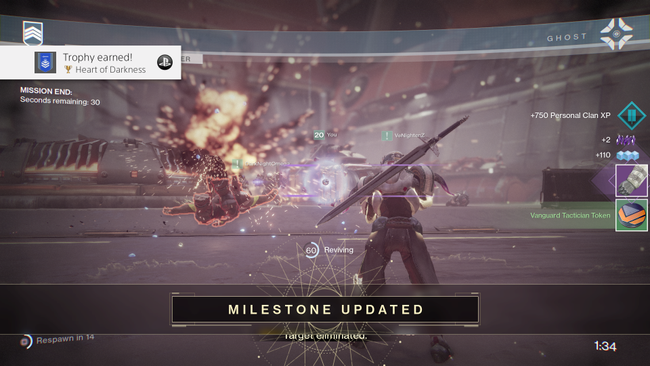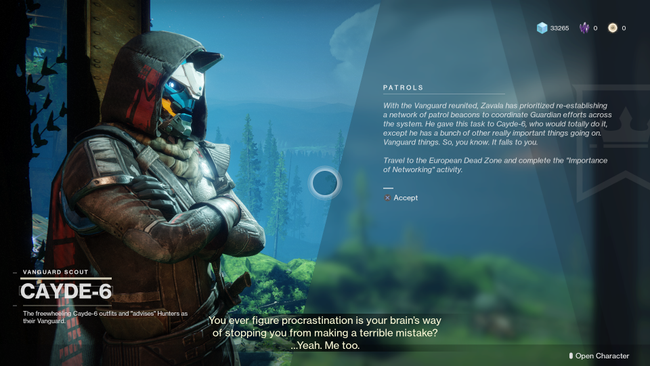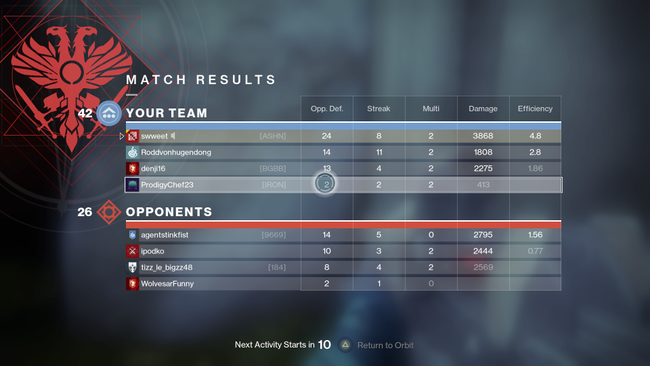
Destiny 2 Review
I've got a confession - I never played the original Destiny. I was super excited for the game before it launched, but once the initial wave of impressions hit and it seemed that the game wasn't exactly what people expected going in, I decided to put the game up on hold... and I just never got around to it. The supposed lack of content was a big part of that, and once my friends put the game aside, I didn't feel any reason to give it any thought after that. After all, if nothing else - Destiny is a series that's almost akin to an MMO. While there is content that you can tackle alone, a good portion of the end-game content is very heavily geared towards playing as a group. Or, so I'd heard.
Near the end of the first Destiny's life I kept hearing bits and pieces about how "the Destiny that's out now is what the game should've been at launch", and that the amount of content felt pretty good near the game's EOL. Once I saw that a solid chunk of my group of friends were picking the game up, I decided to bite the bullet and give Destiny 2 a chance myself. I'm not sure if it's exactly what I expected going in, but after a little more than a week with the game and spending a solid 10 hours or so on the Leviathan raid, I feel pretty confident about my thoughts on the game as a whole.
You'll hear conflicting opinions about whether or not Destiny/Destiny 2 are "MMOs". While I can see both sides of the argument, I don't think the semantics mean that much in the grand scheme of things. Destiny 2 is very much a game that expects you to play with others, and from the inclusion of "Guided Games" allowing players and clans to recruit players for empty slots in multiplayer strikes/raids, that focus is stronger than ever.

While Destiny 2 has a story - complete with cutscenes and all - it's definitely not the meat of the game. Players explore a few different overworlds, finding challenges such as Public Events, Patrols, Quests, or Adventures, and tackle them all in the pursuit of furthering your character. For lack of a better comparison, it felt a lot like Borderlands to me, especially when the player's "Ghost" character and NPCs such as Failsafe, Cayde-6 or Sloan are spouting funny quips in the middle of various missions. I'd definitely say that the humor is less raunchy comparetively, and at least my group of friends felt like it helped keep missions interesting. I was told that mission variety for both Quests and the story were improved over Destiny 1, though I can't really speak to that myself. The final few Story missions did, however, stand out to me as a proper "Bungie" FPS campaign.
On a bit of a side note, Destiny 2 has some outright amazing looking vistas, and an equally fantastic soundtrack to boot. Both really make the admittedly rather empty game worlds feel alive, and stuff like seeing the Leviathan in Nessus' skybox following the Raid's launch just goes to show that Bungie's art team knows what they're doing. If nothing else, it helps make the act of grinding out loot a calm and collected affair, much like the best of MMOs.
Coming back to that Borderlands comparison, the name of the game is finding loot. New guns with various perks, armor pieces, and more. While player characters level up, it's not exactly a long road to the level cap - that being level 20. The bigger measure of a player's experience is "Power", a number that shows just how well a piece of gear compares to anything you already own at a glance. A player's Power level is the average of all of your gear combined, and certain activities are locked out from players attempting them until they reach a specific milestone. For example, the recommend Power for the Leviathan raid - the current end-game content for Destiny 2 - is 270.

I'd say it took me a little over 30 hours to complete all the PvE content in the game besides the Nightfall Strike and the Raid. About 80% if not more of that time was spent playing with friends. Every bit of content in the game past the opening hour is playable with a group, ranging from 3 player "fireteams", to 4 player teams for PvP in the "Crucible" or 6 player teams for Raids. Matchmaking is very easy, and besides a few expected launch hiccups most of my time playing went smoothly.
By this point it might sound like Destiny 2 isn't much of an RPG, and while it's decidedly more of a shooter than anything else, you'd be remiss just assuming that getting new guns and shooting at enemy's heads is all the strategy the game has to give. Each player character is divided into 3 classes - the Hunter, Titan, and Warlock classes. They loosely fill the archetypes for DPS, Tank, and Support classes respectively. Each class has different abilities that can help turn the tide of battle in both PvE and PvP, and each class is divided into 3 subclasses that further divide the abilities that players have at their disposal.
While the differences between each class won't make a major difference in the easier pieces of content in the game, co-ordination between each player class can definitely make the harder content at the end-game easier or harder depending on how well a team can utilize their skills together. It's not outright necessary for finishing the raid - more on that later - but it definitely doesn't hurt to get a grasp of how each class works in the long-run.

Strikes are decently sized missions that have 3 player fireteams pushing themselves through a small gauntlet of enemies across a level before taking on an end boss, most of the time taking anywhere from 15-20 minutes to complete. The Nightfall variants of each Strike adds a certain amount of new modifiers to make the challenge that much harder, while also throwing on a time limit. Although I've only been able to tackle 2 Nightfalls' so far, with only a handful of modifiers, they definitely give players enough reason to tackle them even if they've already played the regular version of the week's Nightfall. While it's perfectly possible to brute-force your way through a regular Strike, Nightfalls require a certain degree of co-ordination and planning due to the time limit and other modifiers attached to their challenges. In other words, communicating with your team is essential.
If Nightfall Strikes require a certain degree of communication, Raids are only for those that have a team that can dedicate themselves to learning their mechanics. Raids are absolutely massive missions that will take even the most skilled of players multiple hours to get through, and necessitate a 6 player fireteam, with each and every player communicating over voice chat. When people say that the difference between Destiny/Destiny 2 and MMOs is semantic, this is probably what they're talking about. Raids are both the most engaging and most frustrating parts of the game, and are absolutely not for everyone.
At the time of this writing, I have completed the "Leviathan" Raid exactly once, though clearing it took many, many hours of attempts. While the raid isn't perfect - looking around online you'll see more than a few complaints about a specific section of it called the "Pleasure Gardens" - working with my Raid group to get as far as we did during the beginning hours of the release reminded me of some of the best Raids I've tackled in "proper" MMOs. So much so that if you're a fan of doing Raids in other MMOs and like FPS games, I feel that this Raid might be enough to whole-heartedly recommend Destiny 2 on its own.
Destiny 2 isn't perfect, and I hesitate to recommend it for solo players, but for anyone that hopes to play in a group - there really is nothing else like it. I can't say if there's enough new here to draw returning players to the game, but Bungie has done nothing if not craft one of the most beautiful engaging co-op experiences of 2017.